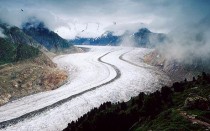By Neil Midgley, UK Telegraph
The BBC has been repeatedly accused of bias in its reporting of climate change issues.
Last year one of its reporters, Paul Hudson, was criticised for not reporting on some of the highly controversial “Climategate” leaked emails from the University of East Anglia, even though he had been in possession of them for some time.
Climate change sceptics have also accused the BBC of not properly reporting “Glaciergate”, when a study from the UN’s Intergovernmental Panel on Climate Change (IPCC) saying that glaciers would melt by 2035 was discredited.

Climate change sceptics have accused the BBC of not adequately reporting the discrediting of a study which said that glaciers would melt by 2035 Photo: GETTY
But the BBC’s new editorial guidelines, published yesterday after an extensive consultation that considered over 1,600 submissions by members of the public, say expressly for the first time that scientific issues fall within the corporation’s obligation to be impartial.
“The BBC must be inclusive, consider the broad perspective, and ensure that the existence of a range of views is appropriately reflected,” said BBC trustee Alison Hastings.
“In addition the new guideline extends the definition of ‘controversial’ subjects beyond those of public policy and political or industrial controversy to include controversy within religion, science, finance, culture, ethics and other matters.”
However James Delingpole, a prominent climate change sceptic, yesterday said that he predicted little movement in the BBC’s environmental stories. “It’s highly unlikely that they’ll be more balanced in their coverage,” he said. “It’s a whole cultural thing at the BBC - that people who don’t believe are just ‘flat earthers’. Whenever they invite dissenters like me on to debates, they surround us with ‘warmists’. On Any Questions, for example, Jonathan Dimbleby does his best to be impartial, but this is a man with a wind turbine in his garden.”
In 2007, a BBC Trust report called Safeguarding Impartiality in the 21st Century said: “Climate change is another subject where dissenters can be unpopular...The BBC has held a high-level seminar with some of the best scientific experts, and has come to the view that the weight of evidence no longer justifies equal space being given to the opponents of the consensus. But these dissenters (or even sceptics) will still be heard, as they should, because it is not the BBC’s role to close down this debate.” See post here.
See also the Telegraph’s James Delingpole’s excellent recap of the Ward and Williams radio debacle in Australia. Ward was the PR director of the Royal Society and now pit bull for Lord Stern’s pathetic Grantham society.




